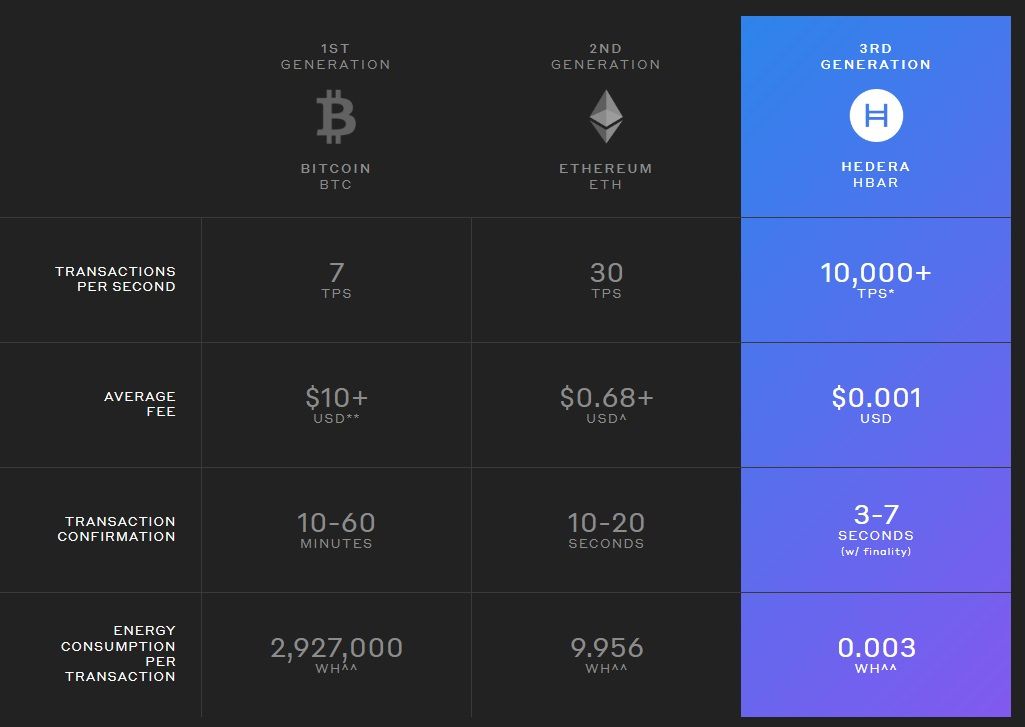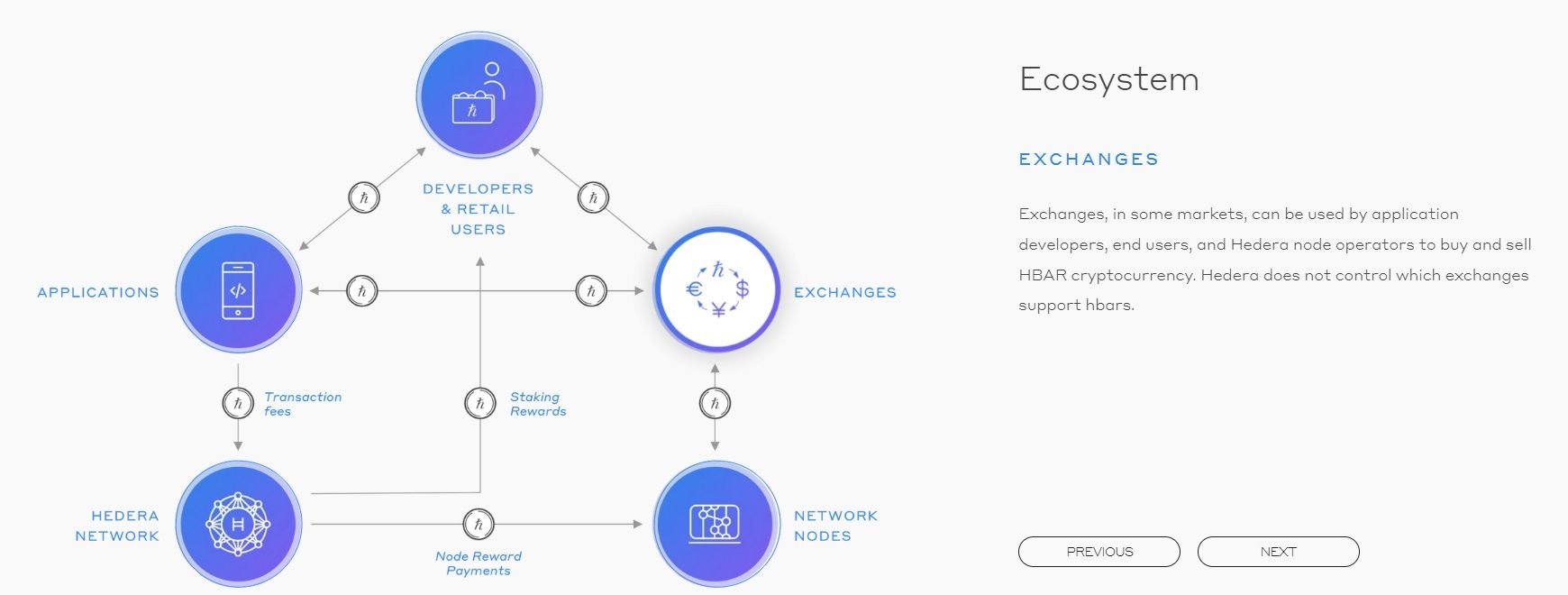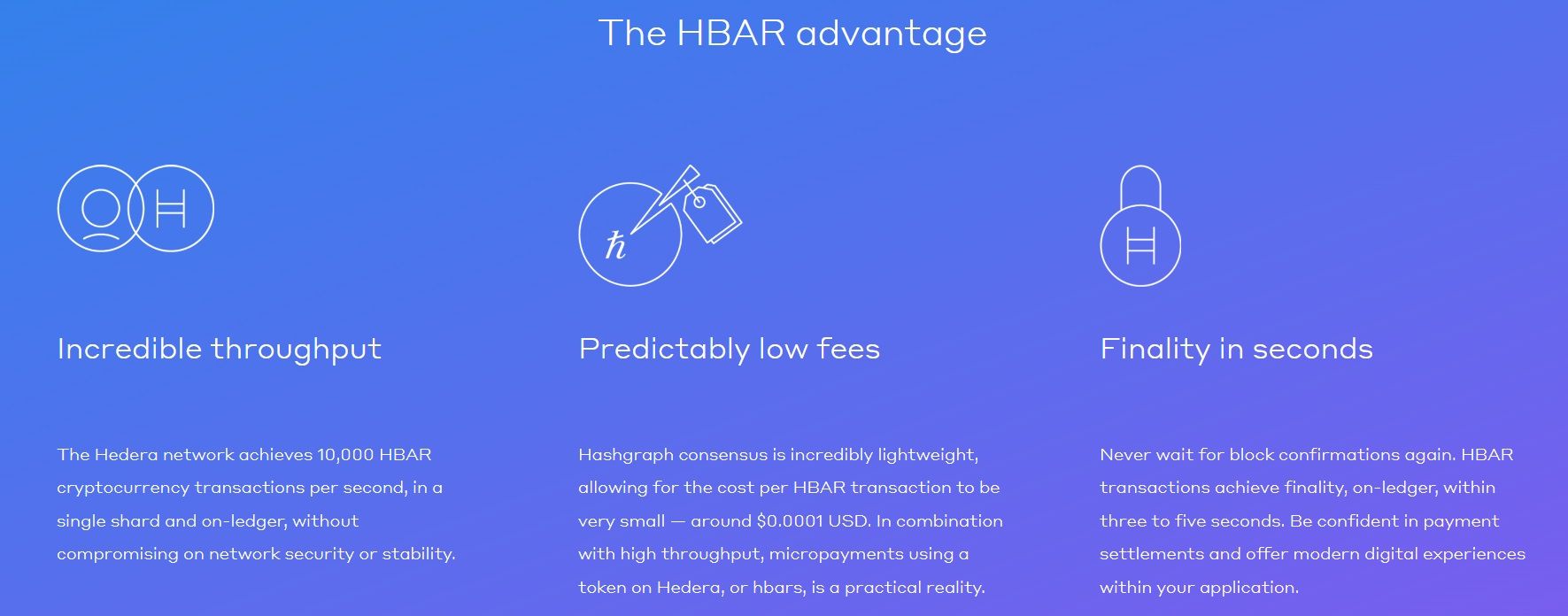The evolution of blockchain technology can be traced through three distinct generations, each building on the innovations and addressing the limitations of its predecessors.
Generation One, epitomized by Bitcoin, introduced the concept of a decentralized digital currency, enabling peer-to-peer transactions without intermediaries. However, Bitcoin's proof-of-work consensus mechanism led to scalability issues and high energy consumption.
Generation Two, represented by Ethereum, introduced smart contracts, enabling programmable transactions and decentralized applications (DApps). While Ethereum's introduction of proof-of-stake (PoS) aimed to address scalability and energy efficiency, it still faced challenges related to transaction speed and cost.
Hedera represents the third generation of blockchain technology, leveraging its unique Hashgraph consensus algorithm to overcome these challenges.
This detailed Hedera review will explore various aspects of Hedera Hashgraph, including its unique Hashgraph consensus algorithm, the Hedera Consensus Service (HCS), the Hedera Token Service (HTS), and the range of decentralized applications within its ecosystem.
What is Hedera?
Hedera is an advanced public distributed ledger technology designed to address the limitations of previous blockchain generations. Utilizing the unique Hashgraph consensus algorithm, Hedera offers significant improvements in speed, security, and scalability.
 The Network Processes Transactions Rapidly and Efficiently. Image via Hedera
The Network Processes Transactions Rapidly and Efficiently. Image via HederaHedera's Hashgraph algorithm is built on gossip-about-gossip and virtual voting principles. This allows the network to process transactions rapidly and efficiently, managing thousands of transactions per second. This performance exceeds that of many traditional blockchain platforms, offering a reliable and high-speed environment for developers and enterprises to create decentralized applications (DApps) requiring high throughput and low latency.
Traditional blockchains, such as Bitcoin and Ethereum, often face challenges with scalability and transaction speed due to their reliance on proof-of-work (PoW) or proof-of-stake (PoS) mechanisms. Hedera's Hashgraph algorithm resolves these issues by providing a more efficient and equitable consensus process, making it an attractive option for businesses and developers seeking to deploy scalable and secure DApps.
The Hedera network was co-founded by Dr. Leemon Baird and Mance Harmon. Dr. Baird, a computer scientist and former professor, is the inventor of the Hashgraph consensus algorithm. Officially launched in 2018, Hedera has received substantial support from industry leaders and features a robust governance model. The network is governed by The Hedera Council, which includes leading global organizations from various sectors, ensuring decentralization and stability.
Understanding Hedera's Technology
Hedera's technology is a groundbreaking innovation in the field of distributed ledger technologies (DLT). Central to this is the Hashgraph consensus algorithm, which sets Hedera apart from traditional blockchain systems. This algorithm is designed to provide high performance, security and fairness.
Hashgraph Consensus
The Hashgraph consensus algorithm is the core of Hedera's technology. Unlike traditional blockchains that rely on proof-of-work (PoW) or proof-of-stake (PoS) mechanisms, Hashgraph uses a process called gossip-about-gossip combined with virtual voting. This approach ensures information about transactions spreads rapidly through the network, similar to how news travels across social media platforms. This method allows Hedera to achieve consensus quickly and fairly, enabling the network to process thousands of transactions per second with finality in just a few seconds.
Smart Contracts
 Hedera's smart contracts are designed to be more predictable and less expensive. Image via Hedera
Hedera's smart contracts are designed to be more predictable and less expensive. Image via HederaHedera supports smart contracts, which are self-executing contracts with the terms of the agreement directly written into code. These contracts can automate complex processes and transactions, reducing the need for intermediaries. Hedera's smart contracts are designed to be more predictable and less expensive compared to those on other blockchain platforms, making them highly attractive for enterprise use.
Hedera Consensus Service (HCS)
The Hedera Consensus Service (HCS) offers a way for applications to achieve decentralized trust by providing a decentralized ordering service for application messages. It acts as a trust layer for any application needing verifiable timestamps and ordering of events. This service is particularly useful for applications requiring audit logs, supply chain visibility, and more.
Hedera Token Service (HTS)
The Hedera Token Service (HTS) allows users to create and manage native tokens on the Hedera network. This service supports the issuance of both fungible and non-fungible tokens (NFTs) with configurable compliance features. HTS provides a flexible and robust framework for token management.
Security and Fairness
Hedera’s architecture ensures a high degree of security and fairness. The Hashgraph consensus algorithm guarantees that no single node can manipulate the transaction order, and all nodes participate equally in the consensus process. Furthermore, Hedera's asynchronous Byzantine Fault Tolerance (aBFT) ensures that the network remains secure even in the presence of malicious actors.
Hedera in the Blockchain Ecosystem
Hedera Hashgraph boasts several unique properties that set it apart in the blockchain ecosystem.
At the heart of its innovation is the Hashgraph consensus algorithm, which ensures fast, secure, and fair transaction processing. This technology enables Hedera to handle over 10,000 transactions per second, a significant improvement compared to many blockchain competitors like Bitcoin and Ethereum.
 Third Gen is Leaps Ahead. Image via Hedera
Third Gen is Leaps Ahead. Image via HederaHedera’s Hashgraph technology employs gossip-about-gossip and virtual voting mechanisms, resulting in rapid and efficient consensus. This method minimizes communication overhead and reduces the time to finality, making Hedera significantly faster and more scalable than traditional blockchain systems. For instance, while Ethereum 2.0 aims to improve scalability, it still cannot match the transaction speed and finality offered by Hedera.
Security and Fairness
Security is a paramount concern in any distributed ledger technology. Hedera provides asynchronous Byzantine Fault Tolerance (aBFT), ensuring that the network remains secure even in the presence of malicious actors.
Governance Model
Hedera's governance is managed by the Hedera Council, composed of leading global organizations from diverse industries. This governance structure ensures decentralization and avoids the pitfalls of centralization seen in some other blockchain projects.
Interoperability and Flexibility
Hedera also excels in interoperability and flexibility. The Hedera Token Service (HTS) allows for the easy creation and management of native tokens, supporting both fungible and non-fungible tokens (NFTs). This flexibility is crucial for enterprise applications and is a step ahead of many competitors who are still developing similar functionalities.
Criticism and Challenges
Despite its advantages, Hedera is not without its challenges. The relatively centralized nature of the Hedera Council has drawn some criticism, as it relies on a fixed number of council members to make decisions. This could potentially limit decentralization in the long term. Additionally, while Hedera's technology is advanced, it faces the typical hurdles of adoption and integration that any new technology encounters in a competitive market.
Hedera Token Service
The Hedera Token Service (HTS) allows users to create and manage native tokens with ease.
HTS supports the issuance of both fungible and non-fungible tokens (NFTs), offering a comprehensive solution for tokenization needs. This service is designed to provide efficiency, flexibility, and security for enterprises and developers looking to leverage the benefits of tokenization.
 HTS Provides a Flexible and Robust Framework for Token Management. Image via Hedera
HTS Provides a Flexible and Robust Framework for Token Management. Image via HederaHTS simplifies the process of creating and managing tokens on the Hedera network. Users can issue tokens with configurable compliance features, such as KYC (Know Your Customer) requirements, transfer restrictions, and more. This flexibility ensures that tokens can meet regulatory standards and business requirements. Unlike some competitors, which may have more cumbersome token creation processes, HTS provides a streamlined and user-friendly interface for token management.
HTS provides granular control over token properties. Users can configure token supply, enable or disable tokens, and set permissions for token management. This granularity allows for precise control and customization to meet specific needs. For example, the ability to freeze and unfreeze tokens can be crucial for regulatory compliance, while setting treasury accounts helps manage token distribution and governance.
The compliance tools provided by HTS are particularly advanced. They allow token issuers to integrate regulatory requirements directly into the token’s logic. This includes the ability to impose KYC and AML (Anti-Money Laundering) checks, ensuring that the tokens comply with local and international regulations. These tools make HTS a preferred choice for enterprises operating in heavily regulated industries.
HTS is designed to be cost-effective and scalable, accommodating the needs of both small developers and large enterprises. The low and predictable transaction fees on the Hedera network make it an attractive option for tokenization projects, especially when compared to other blockchain platforms that may have higher or more volatile fees.
Hedera Consensus Service
The Hedera Consensus Service (HCS) enables developers to create verifiable and ordered event logs for any application. HCS offers a decentralized and tamper-proof way to timestamp and sequence events, providing a transparent and reliable source of truth for applications.
Here are the key features:
- Decentralized Ordering HCS allows for the decentralized ordering of events, ensuring that all transactions are timestamped and recorded in a specific sequence.
- Tamper-Proof Logs: The consensus mechanism used by HCS ensures that all logs are tamper-proof. The Hedera network's Hashgraph consensus algorithm provides a secure and reliable way to achieve consensus, making it impossible for any single entity to alter the recorded events.
- Scalable and Efficient: HCS is designed to be highly scalable and efficient, capable of handling thousands of transactions per second.
- Integration with Other Services: HCS integrates with other Hedera services, such as the Hedera Token Service (HTS). This integration allows developers to leverage the capabilities of multiple services within the Hedera ecosystem.
The Hedera Ecosystem
The Hedera ecosystem is home to a diverse range of DApps that leverage the unique properties of the Hedera Hashgraph. These DApps cover various industries, showcasing the flexibility and robustness of the Hedera platform.
 The Hedera Ecosystem is Home to a Diverse Range of Decentralized Applications. Image via Hedera
The Hedera Ecosystem is Home to a Diverse Range of Decentralized Applications. Image via Hedera- Kabila is a decentralized application focused on providing community-driven initiatives. It utilizes Hedera's network to foster collaboration and resource sharing among members.
- Karate Combat is a sports entertainment platform that offers immersive martial arts experiences. By using Hedera, it ensures secure and transparent transactions for its digital collectibles and fan interactions.
- Xeni is a travel marketplace that integrates blockchain technology to enhance transparency and efficiency in booking and travel transactions. Hedera's network supports the high volume of transactions required for such services.
- Hashport facilitates the secure transfer of digital assets across different blockchains. It leverages Hedera’s consensus algorithm to ensure fast and reliable asset transfers.
- Heliswap is a decentralized exchange that operates on the Hedera network, providing fast and cost-effective token swaps.
- Hashgraph.name offers a decentralized domain name service on the Hedera network. It ensures secure and tamper-proof registration of domain names using Hedera's infrastructure.
- Hashpack is a wallet solution designed for Hedera-based assets. It provides users with secure storage and management of their HBAR and other Hedera tokens, utilizing the network’s security features.
- Blade Wallet is another secure wallet application for Hedera. It offers a user-friendly interface for managing digital assets and interacting with various DApps within the Hedera ecosystem.
- EarthID is a decentralized identity management platform that uses Hedera for secure and private identity verification. It helps users control their personal data and share it selectively with trusted parties.
- Bountyblok is a gamification platform that incentivizes user engagement through rewards and challenges. By leveraging Hedera’s network, it ensures the reliable distribution of rewards.
- Road Code promotes safe driving by rewarding users for following traffic rules. It uses Hedera’s network to securely track and verify driving behavior.
Hedera Use Cases
Hedera's unique technology supports a wide range of use cases, providing solutions across various industries. Here are some of the notable applications leveraging Hedera's capabilities:
- Data Integrity and AI: Hedera ensures the integrity of data used in AI applications by providing a tamper-proof and verifiable log of data inputs and outputs. This is crucial for maintaining the reliability and transparency of AI models, which can be critical in industries such as finance, healthcare and supply chain management.
- Real-World Asset Tokenization: Hedera facilitates the tokenization of real-world assets, enabling the digital representation of physical assets such as real estate, commodities, and art. This process enhances liquidity, simplifies transactions, and opens up new opportunities.
- Decentralized Identity: Decentralized identity solutions on Hedera empower users to manage and share their personal data securely. Hedera's network provides a framework for creating and verifying digital identities, which can be used for various applications, including secure access control, regulatory compliance, and user authentication.
- Decentralized Finance: Hedera supports a variety of DeFi applications, offering a platform for creating decentralized financial services such as lending, borrowing, trading and payments.
- Payments: Hedera's network enables fast, secure, and low-cost payments, making it suitable for a wide range of payment applications. From micropayments to cross-border transactions, Hedera provides the infrastructure needed to process payments quickly and efficiently.
- Supply Chain Management: Hedera improves supply chain transparency by providing a decentralized ledger that records each step of the supply chain process. This ensures that all stakeholders have access to accurate and real-time information, reducing the risk of fraud and increasing efficiency.
- Energy and Sustainability: Hedera is used in energy markets to create more efficient and transparent systems for trading energy credits and managing renewable energy resources. The secure and scalable nature of Hedera’s network supports the development of sustainable energy solutions and enhances the traceability of energy sources.
- NFTs: Hedera supports the creation and management of NFTs. This capability is leveraged in various industries, including art, gaming, and entertainment.
HBAR Token
HBAR is the native cryptocurrency of the Hedera network, designed to power the platform's services and applications. HBAR plays a crucial role in maintaining the network's security and functionality.
HBAR serves multiple purposes within the Hedera ecosystem. It is:
- Used to pay for transaction fees, ensuring that operations on the network are cost-effective and efficient.
- Utilized to secure the network through a proof-of-stake (PoS) mechanism, where holders can stake their tokens to support network consensus and earn rewards.
HBAR Tokenomics
HBAR has a fixed total supply of 50 billion tokens. The distribution of these tokens is designed to support the growth and stability of the network. A portion of the tokens is allocated for network governance, incentivizing node operators, and rewarding developers and users who contribute to the ecosystem. The release of HBAR tokens is controlled and predictable, ensuring a stable and sustainable economic model for the Hedera network.
 HBAR is The Native Cryptocurrency of the Hedera Network. Image via Hedera
HBAR is The Native Cryptocurrency of the Hedera Network. Image via HederaAccording to the Hedera Treasury Management Report, HBAR tokens are distributed strategically to support the network's long-term goals. The report provides detailed insights into how tokens are allocated across different areas, ensuring transparency and efficient management of the token supply.
How to Buy HBAR
To purchase HBAR, users can utilize various cryptocurrency exchanges that list the token.
Major exchanges like Binance, Bybit and OKX offer HBAR trading pairs, allowing users to buy HBAR with fiat currencies or other cryptocurrencies. Also, check out our top picks for the best crypto exchanges.
Where to Store HBAR
After purchasing HBAR, it is essential to store it securely. Several wallet options support HBAR, including hardware wallets and mobile wallets. Here are a few popular options:
Ledger Nano S/X: A hardware wallet providing robust security for storing HBAR offline.
Atomic Wallet: A software wallet that offers a user-friendly interface and supports multiple cryptocurrencies, including HBAR.
MyHbarWallet: A web-based wallet specifically designed for HBAR, providing easy access and management of your tokens.
Hashpack: A dedicated Hedera wallet that supports HBAR and other Hedera-based assets, offering a secure and interactive user experience.
Hedera Review: Closing Thoughts
Hedera represents a significant advancement in the blockchain industry, offering solutions to many of the challenges faced by previous generations. Its Hashgraph consensus algorithm provides unparalleled speed, security, and scalability, making it a strong contender for decentralized applications and enterprise solutions.
Comparatively, Hedera outperforms first-generation blockchains like Bitcoin in terms of transaction speed and energy efficiency. It also offers more robust and scalable solutions than second-generation blockchains like Ethereum, especially with its low and predictable transaction fees. Despite these advantages, Hedera must continue to innovate and expand its ecosystem to maintain its competitive edge.
Overall, Hedera Hashgraph presents a promising future for the blockchain industry with its advanced technology and comprehensive suite of services. It is well-positioned to drive innovation and efficiency across various sectors, although it must navigate the complexities of adoption and market competition.





